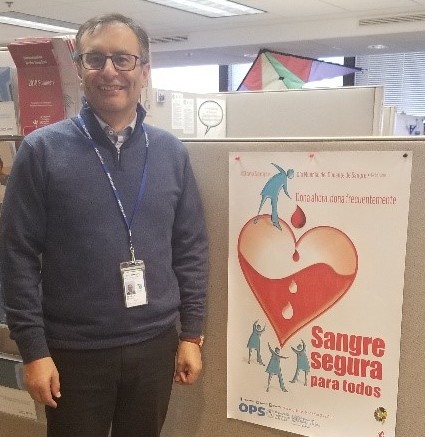PAHO/WHO Collaborating Centre Spotlight Series
Reference Number: ARG-42
Official Title: PAHO/WHO CC on Donation and Transplantation
Institution: Centro Único Coordinador de Ablación e Implante (INCUCAI)
Reference Number: BRA-53
Official Title: PAHO/WHO CC for Quality Control of Serology in Blood Banks
Institution: Superintendência de Serologia e Controle de Qualidade, Fundação Pro-Sangue-Hemocentro de São Paulo (FPS/HSP)
Category 4 (SP 14-19)
Outcome 8 (SP 20-25)
Mr. Mauricio Beltran Duran, Regional Advisor, Blood Transfusion and Organ Transplants, is the PAHO staff member who acts as the Region’s focal point to coordinate the collaboration between the institution and the Organization.
The main activities of these Centres include: (1) creating reference technical reports for blood banks, transplants and donations; (2) evaluating Chagas test kits; and (3) conducting training courses for the implementation of donation and transplant process/programs.
The Centre at INCUCAI has supported the creation of the first Regional report of the donation and transplant registry across numerous Latin American countries which aligns with PAHO’s objective to promote the participation of countries in the DONASUR (El registro de donación y trasplante de la Unasur). In addition, the Centre provides five courses annually, related to training in procurement and transplantation of organs and tissues with each course having 12-20 participants. Occasionally, with support from INCUCAI, training courses are offered to other institutions in Brazil and Uruguay.
The Centre at the Fundação Pro-Sangue-Hemocentro de São Paulo is supporting the Organization to produce WHO reference panels for the Control of Chagas for Diagnostic Tests and performing the regional external quality control evaluation of serology in blood banks. The Centre provides one-week training workshops focused on blood bank activities for professionals from the Brazilian Health Surveillance Center and has also provided courses focused on immunohematology for professionals from regional and national hospitals across Brazil.
Mr. Beltran notes “as a result of this collaboration, there has been an improvement of blood bank processes and diagnostics in different countries within the Region.”
Webnotes such as these serve to inform how Collaborating Centres are contributing to the Organization’s priorities and mandates.


